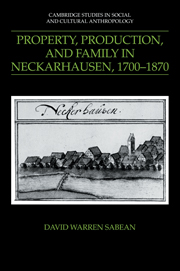Book contents
- Frontmatter
- Contents
- List of tables
- Abbreviations
- Abbreviations of sources
- Weights, measures, and coinage
- On reading kinship diagrams
- Glossary
- Preface
- Dedication
- Introduction
- 1 Productive forces and social differentiation
- 2 Magistrates and records
- 3 The ideology of the house
- 4 Patterns of marital conflict
- 5 The changing context of production
- 6 Marital relations in the context of production
- 7 Marital estate
- 8 State and estate
- 9 Marital fund
- 10 Generational transition
- 11 Reciprocities of labor and property
- 12 Reciprocities in parent–child relations
- 13 Authority, solidarity, and abuse
- 14 Family charges on the transfer of property
- 15 The real estate market
- 16 Kinship and the sale of property
- Conclusion
- Appendix
- Bibliography
- Index
- Cambridge studies in social and cultural anthropology
16 - Kinship and the sale of property
Published online by Cambridge University Press: 09 February 2010
- Frontmatter
- Contents
- List of tables
- Abbreviations
- Abbreviations of sources
- Weights, measures, and coinage
- On reading kinship diagrams
- Glossary
- Preface
- Dedication
- Introduction
- 1 Productive forces and social differentiation
- 2 Magistrates and records
- 3 The ideology of the house
- 4 Patterns of marital conflict
- 5 The changing context of production
- 6 Marital relations in the context of production
- 7 Marital estate
- 8 State and estate
- 9 Marital fund
- 10 Generational transition
- 11 Reciprocities of labor and property
- 12 Reciprocities in parent–child relations
- 13 Authority, solidarity, and abuse
- 14 Family charges on the transfer of property
- 15 The real estate market
- 16 Kinship and the sale of property
- Conclusion
- Appendix
- Bibliography
- Index
- Cambridge studies in social and cultural anthropology
Summary
Johann Georg Riempp complains that his brother-in-law Muhleisen in Altdorf sold a meadow in Schimmel to David Henzler in Raidwangen and drove up the price of the meadow so high that Riempp as brother-in-law would not be able to get any of it.
- Ruggerichtsprotocoll (1803)This chapter investigates the degree to which the kinship network in Neckarhausen was mobilized for various purposes. In any society, kin are found interacting in some situations and not in others. And there are many times when kin can transact business with each other but when kinship as a principle of their dealings is not the pertinent point. In Neckarhausen, for example, the group of young men out on the streets together at night constituted first and foremost an age cohort. That some of them might have been cousins had little to do with the fact of their being together. In order to approach the problems of the structure, meaning, and perception of kinship, we will have to map out systematically certain regularities of behavior. Much of the available documentation involves complicated manipulations and clumsy, roundabout methods for getting at rather simple issues. Even then the practices we want to expose often remain frustratingly elusive. Only when we trace enough paths through the material will we be able to survey the network of interconnections. Given our sources, we can, for example, look at the names people gave their children as an indicator of the relative weight they gave to those kin selected as namesakes. But the tabular descriptions of frequency distributions suffer from “thinness” and abstraction.
- Type
- Chapter
- Information
- Property, Production, and Family in Neckarhausen, 1700–1870 , pp. 371 - 415Publisher: Cambridge University PressPrint publication year: 1991

